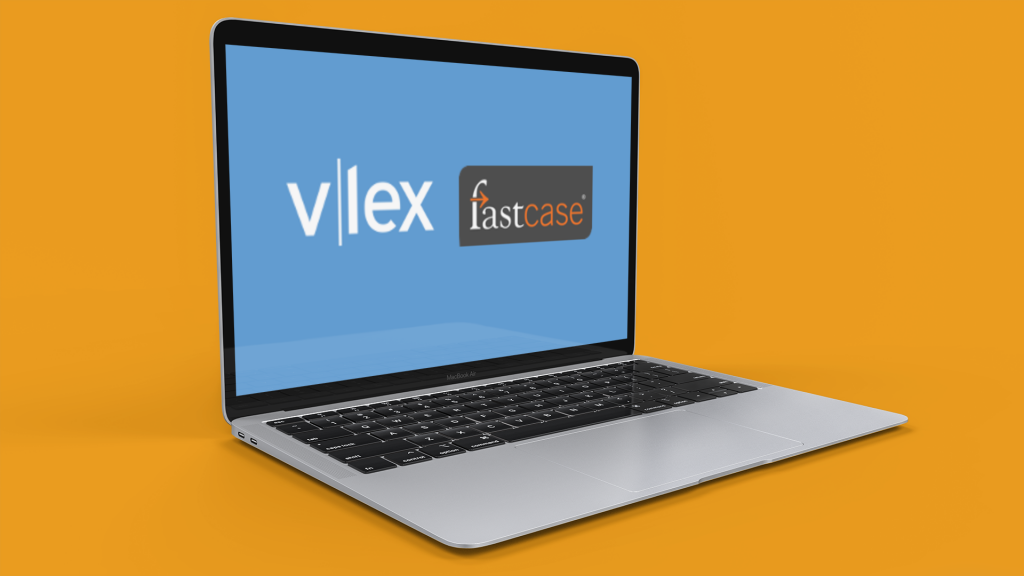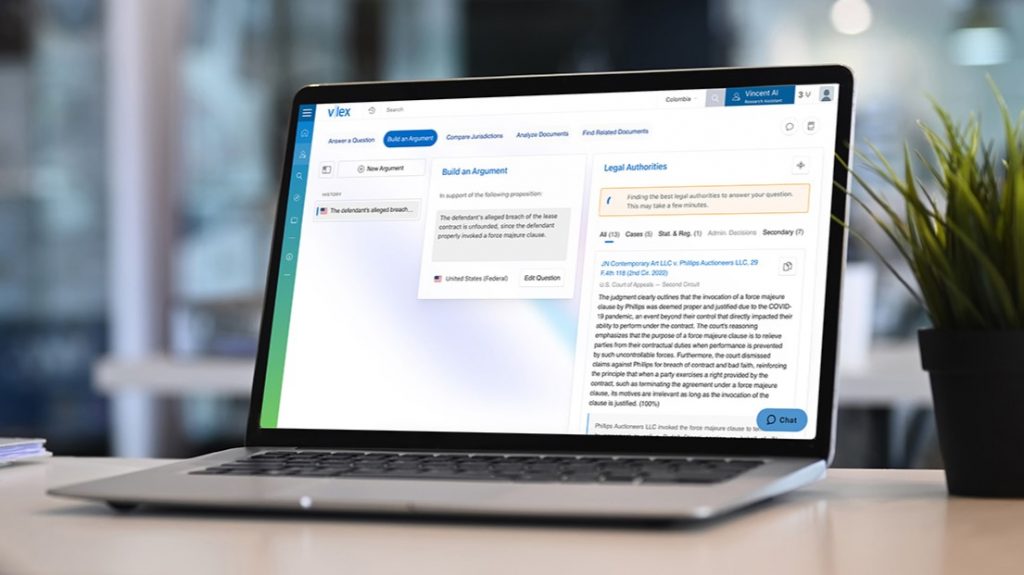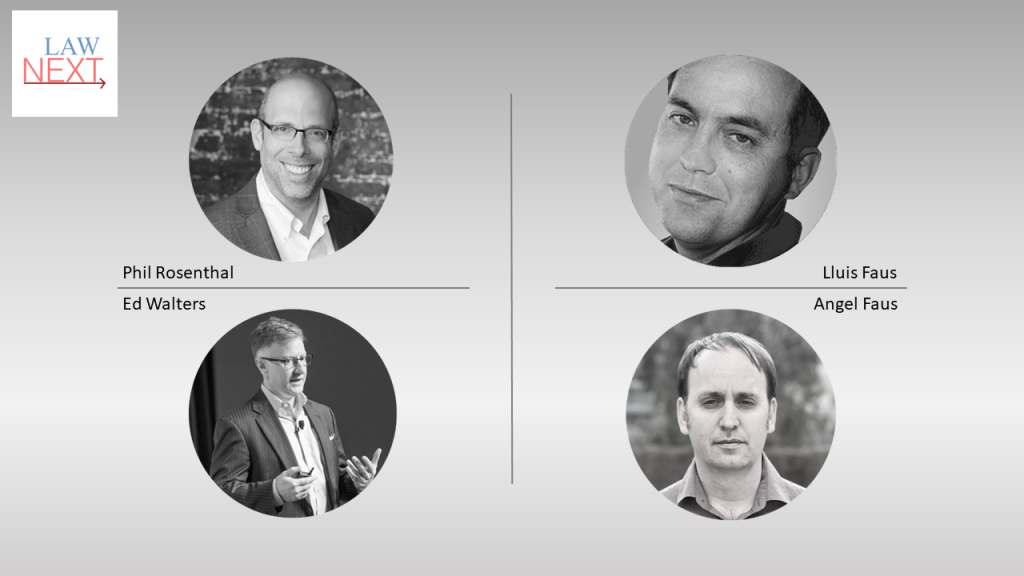
In a deal that will reshape the legal research and legal technology landscape on a global basis and threaten the longstanding “Wexis” legal research duopoly, the companies vLex and Fastcase today announced that they have merged into a single entity that they say will have the world’s largest subscriber base of lawyers and law firms and a legal research library of more than 1 billion documents from more than 100 countries.
As part of the merger, Oakley Capital, a major European private equity investor, which last September acquired majority ownership of vLex, and Bain Capital Credit, a global credit specialist with some $42 billion in assets under management, are investing an undisclosed amount in the combined business to expand its global reach and accelerate its development of artificial intelligence tools for the legal market.

Lluís Faus will become global CEO.
The combined entity will be called vLex Group and will be led by Lluís Faus as global CEO. Faus was cofounder of vLex in Barcelona in 2000 and had been its CEO ever since. It will maintain headquarters in Washington, D.C., Miami and Barcelona.
The two founders of Fastcase, CEO Ed Walters and President Phil Rosenthal, who started their company in 1999, will remain with the company in global executive roles and take seats on the merged company’s board, together with Faus and his cofounder and brother Angel Faus, who is CTO of vLex.
Unique Global Breadth
vLex has been unique among legal research services for its breadth of international coverage. It provides access to comprehensive primary and secondary law collections from more than 100 countries.
The company told me last year that its collection of case law, legislation, journals and dockets serves over 2 million users across Europe, Africa, Asia, Oceania, the Caribbean, and the Americas.
Its platform includes Vincent, an AI-powered legal research assistant that analyzes legal documents that users upload and finds relevant search results. It works in both English and Spanish.
In 2019, vLex acquired Justis Publishing Ltd., a 33-year-old UK legal publisher with clients in more than 40 countries including the UK, Ireland, the United States, Canada, the Caribbean, Hong Kong, Singapore, Australia, and New Zealand.
Historically, vLex has not had as strong a foothold in the United States, but in recent years, it has been driving to expand its growth here, particularly since its acquisition by Oakley last September. Just last week, vLex had announced a partnership with the American Bar Association to offer access to materials from the ABA’s Antitrust Law Section.
For U.S. primary legal research materials, vLex originally partnered with the legal research service Casemaker to obtain U.S. case law and other materials. After Fastcase acquired Casemaker in 2021, vLex partnered with Fastcase for U.S. primary law.
As for Fastcase, it claims to have a subscriber base in the U.S. of more than 1 million lawyers, or more than three-quarters of all lawyers in the United States. In significant part, it has built this subscriber base through its partnerships with state and local bar associations as a preferred member benefit.
Originally a legal research company, Fastcase has diversified in recent years, launching its Full Court Press publishing arm and acquiring Docket Alarm and Law Street Media in 2018, NextChapter in 2019, and the technology and team of Judicata in 2020.
Other than a seed round from family and friends and one outside investor not long after it was founded in 1999, Fastcase has never taken outside investment and has bootstrapped its growth through revenues.
“Bringing these two highly successful businesses together will help democratize the law for legal professionals worldwide through a dynamic and robust platform that improves legal research accuracy, efficiency, and affordability,” Lluís Faus said in a statement provided by the company.
‘End of the Legal Research Duopoly’
In an interview last yesterday, Fastcase CEO Ed Walters called this the most consequential merger in the history of legal technology.
“Legal research is the most used and most important legal tech that exists,” Walters said. “That market has been dominated worldwide by two companies for as long as anyone can remember. This is the beginning of the end of the duopoly in legal research.”

Fastcase founders Rosenthal and Walters in 2019.
From Fastcase’s earliest days, Walters and Rosenthal have said that the company’s mission was to democratize the law through affordable pricing and smarter technology.
That has also been the mission of vLex, Walters told me. “Now, our mission to democratize the law is no longer constrained by the geographic boundaries of the U.S.”
He described this deal as a merger of equals, of two companies that were founded within a year of each other, that have been pushing towards the same goal, and that now have a shared goal of building a truly global law library.
“The vision here is to have a global law library with all of the world’s law online and accessible to everybody, and translatable from every language to every language,” Walters said. “I don’t think there is another company that could execute on this vision.”
He said that both he and cofounder Rosenthal will remain with the company and in fact are reinvesting in the combined company.
“What excited me is, with strong financial backers like Oakley and Bain, what we could do with that. Take two disciplined companies that are a good fit for each other, and a shared strategic vision, and the backing of two of the best funds in the world, and the sky’s the limit.”
Walters said that the two companies’ products will retain their branding, with vLex as the primary brand outside the U.S. and Fastcase, Docket Alarm and NextChapter continuing within the U.S.
Both companies’ management teams are remaining, but the details of the organizational chart are still being worked out, he said.
Opportunities for AI and Taxonomy
At a time when so much of the legal industry is focused on the potential applications of large language models, this merger will create the largest data training set in the legal market, Walters said, leading to new opportunities for development of generative AI.
“With the merger of vLex and Fastcase, nobody has a more extensive global law library than we do,” Walters said. “This is the biggest legal data corpus ever assembled, including highly valuable structured data with industry-standard tags and analytics. The combined library is the crown jewel of LLMs and the ultimate training data set for legal AI.”
Neither company is new to AI, he pointed out. vLex developed one of the first AI assistants for legal research, called Vincent, and it has long used an internal AI tool, Iceberg, to structure the data it collects from courts and other sources.
Fastcase’s Docket Alarm was one of the first legal tech companies to integrate OpenAI’s GPT-3.5, and both Fastcase and Docket Alarm use AI to create structure and tags in legal documents.
The companies said that they will use their combined financial strength to accelerate growth and to invest more in the frontiers of artificial intelligence in law.
The merger could also help accelerate global adoption of a common set of data standards for classifying legal work. The SALI Alliance – short for Standards Advancement for the Legal Industry – recently released version 2.0 of its Legal Matter Standard Specification, which sets out an ontology of some 10,000 tags.
A principal developer of the SALI standards is Damien Riehl, who works at Fastcase as vice president for litigation workflow and analytics content.
In our conversation yesterday, Fastcase said that extending the SALI taxonomy to the combined vLex global library could be extremely powerful for legal research, enabling highly specific searches across laws around the world and in any language.
Global Vision
Walters said that the merger will not impact Fastcase’s partnerships with bar associations, except perhaps to extend the legal research materials available to their members. “Our plan is to continue being the best bar partner there is,” he said. “This doesn’t change anything.”
The merger also will have no impact on any of the products’ subscription models, Walters said.
Walters said Fastcase and vLex had wanted to do this deal for several years and had been working on closing it since last fall. Although the dollar value of the deal is not being disclosed, Walters said, “It’s enough for us to pursue the vision for a global law library at scale.”
Related LawNext Podcast Episodes:
Related LawNext Legal Technology Directory Listings:
 The global legal research company vLex today announced the launch of Vincent AI Document Analyze, a new tool in its suite of generative AI features that enables legal professionals to analyze litigation and transactional documents and surface legal and factual information that they can use in preparing a response. Also today, vLex said it has […]
The global legal research company vLex today announced the launch of Vincent AI Document Analyze, a new tool in its suite of generative AI features that enables legal professionals to analyze litigation and transactional documents and surface legal and factual information that they can use in preparing a response. Also today, vLex said it has […]





